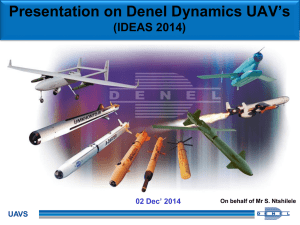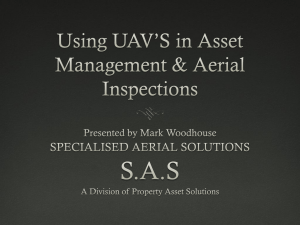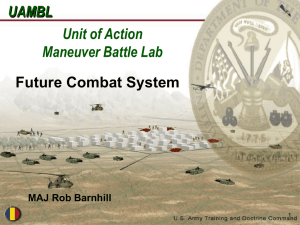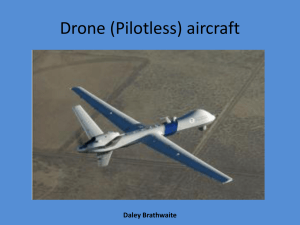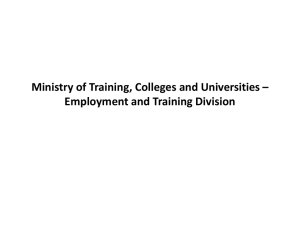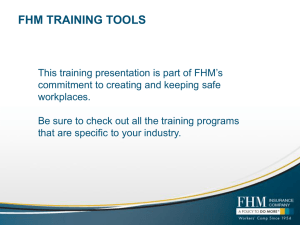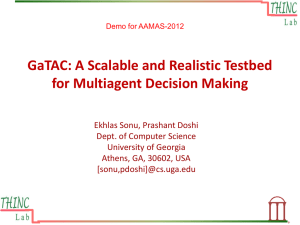Presentation - Ned Dimitrov
advertisement
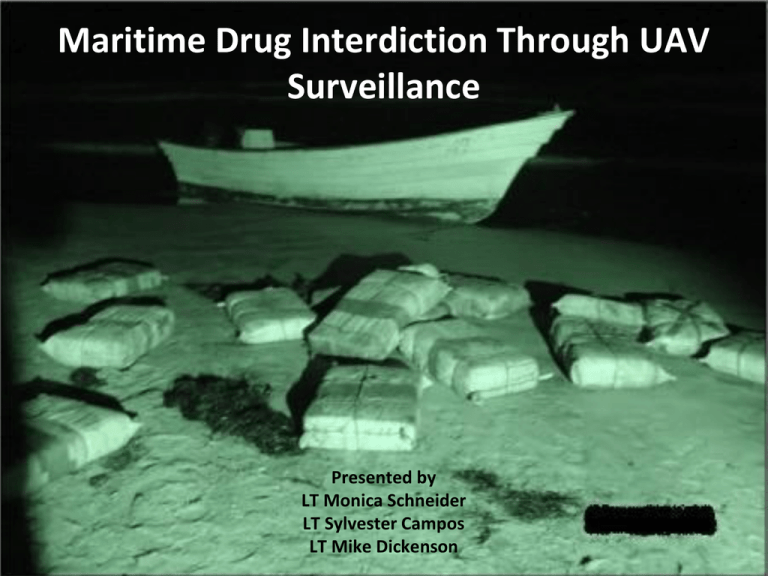
Maritime Drug Interdiction Through UAV Surveillance Presented by LT Monica Schneider LT Sylvester Campos LT Mike Dickenson Background • US Counter Drug Programs • Goal: Reduce the flow of Latin American sourced Illicit drugs into the U.S. • Interdiction methods • Stricter Cross Border Control • Supply reduction - Crop Eradication • Primary source of Cocaine • Bolivia, Columbia, Peru account for all cocaine harvested in the world 2012 CBP Cocaine Seizure Statistics • Coastal Border Sectors • 24 Seizures • 5,953 Pounds • Southwest Border Sectors • 457 Seizures • 5,992 Pounds Drug Traffickers Transport Methods Self-Propelled Semisubmersibles (SPSSs) Go-Fast Boats Fishing Vessels Container Ships The Latest in the Drug War “Operation Martillo” • Operation Martillo is a multinational interagency and joint military operation that combats aerial and maritime drug trafficking off Central America’s coasts. U.S. military participation is led by Joint Interagency Task Force South (JIATF), a component of U.S. Southern Command. • Partnership of 14 various countries Successes of Operation Martillo • January 24, 2013 – Coast Guard intercepted 1,400 pounds of cocaine ($17 million) from a smuggler go-fast boat • April 26, 2013 – Coast Guard intercepted 2,200 pounds of cocaine ($27 million) from a fishing vessel • June 1, 2013 - $527 million worth in Cocaine from 2 Speed Boats Assets for Maritime Interdiction • Support from 4th Fleet • 4 Frigates Patrol in 2 zones (Pacific/Atlantic) coasts of South America • Coast Guard A/C and Cutters • 600 Person Multiagency Task Force • Partner nations contribute Patrol Boats and P3’s (Canada) • 4 UAV’s MQ-9 Predator General Characteristics Primary Function: Airborne surveillance and target acquisition Fuel Capacity: 100 gallons Payload: 450 pounds Speed: Cruise speed around 84 mph (70 knots), up to 135 mph Ceiling: up to 50,000 feet Endurance: Up to 30 hours Cost: $16.9 Million Crew (remote): Two (pilot and sensor operator Tracking: FMV monitored by controlling station or uplinked with an asset. Capable in low visibility (cloud cover) and inclement weather Intent • UAV’s will be able to spot drug traffickers and then report back to a command center, which will alert the Coast Guard, Navy or authorities from Caribbean or Central American nations to take action. UAV Search Graph • Original Problem • Cocaine & Marijuana • All possible routes • Max Flow • Project Focus • Cocaine • Maritime Routes • Max Flow with shortest path properties Network Model • Max Flow Network Model / Modified Min Cost Flow to force shortest path properties • Nodes • Demand Nodes - Corpus Christi, Miami, New Orleans • Supply Nodes – Equally Distributed Supply Nodes along Latin American Coast (53 Total) • Edges – All neighboring water nodes are connected Network Edges • Each Node over water Is connected by an edge • Flow moving from Supply nodes to Demand nodes Supply & Demand Nodes • Supply Nodes • Equally Distributed • 53 Supply Nodes • 625lbs each • Demand Nodes • Miami - 9,922 • New Orleans 9,921 • Corpus Christi 13,282 • Transit Nodes • 329 Equally Distributed Supply • Distance vs Profit • Annual estimated flow Assumptions • • • • Cocaine travels from supply to demand nodes shortest feasible path Presently 15% rate of seizure of all drugs in the demand regions UAVs are available to be on station 24/7 UAVs identify targets and tracks until forces arrive for apprehension (never leave station after they are assigned best grid location) • 100 percent detection rate of drug running vessels transiting through UAVs’ station. • Can not interdict within 60 km off US coast • Each node is 1° degree of latitude and longitude Analysis • 33,126 lbs transported from all supply nodes Combined • Node distinction The “Interesting Questions” • How much drug flow can be interdicted? • How many UAVs do we need to stop as much drug flow as possible? • Marginal cost of adding UAV interdictions? • At what levels can the program be fiscally justified? Interdictions • UAVs can be assign 1 to multiple nodes to survey • Probability of detection is initially 1 when assigned a single node and is reduced to 1 divided by number of nodes assigned • UAVs never participate in apprehension • Apprehension away from UAV station • No Interdictions with 60 miles of US Coastline • UAV yearly mission cost $18.4 Million per UAV 1 UAV Interdiction Total/Change • 11,328 lbs seized • $133 Million • 34.2% reduction • Seizure Cost • $1,641/lbs • $0.54 Million/% 2 UAV Interdictions Additional 5,625 lbs • $66.5 Million • 17.0% reduction Total 16,953 lbs seized • $200 Million • 51.2% reduction Seizure Cost • $2,171/lbs • $0.72 Million/% 3 UAV Interdictions Additional 5,000 lbs • $59.1 Million • 15.1% reduction Total 21,953 lbs seized • $259 Million • 66.3% reduction Seizure Cost • $2,514/lbs • $0.83 Million/% 4 UAV Interdictions Additional 2,500 lbs • $29.5 Million • 7.5% reduction Total 24,453 lbs seized • $289 Million • 73.8% reduction Seizure Cost • $3,010/lbs • $1.0 Million/% 5 UAV Interdictions Additional 1,250 lbs • $14.8 Million • 3.8% reduction Total 26,003 lbs seized • $307 Million • 78.4% reduction Seizure Cost • $3,538/lbs • $1.2 Million/% Patterned Interdictions Additional 2,656 lbs • $31.4 Million • $6,927 / lb Additional 3,144 lbs • $37.2 Million • $5,852 / lb $/lb Number of Interdictions Number of Interdictions Further Research • Increase complexity by removing as many assumption as possible • Specific UAV parameters • Joint coordination timelines/requirements/assests • Refueling and replacement plans for UAV for management of assets (time to station) • Improve intelligence on drug smuggling process References • “Just the Facts” A Civilians Guide to U.S. Defense and Security Assistance • http://justf.org/blog/2013/03/12/operation-martillo-southcoms-counternarcotics-operationcentral-americas-coasts • Statfor Global Intelligence • http://www.stratfor.com/weekly/mexicos-cartels-and-economics-cocaine?older=1353501041 • 162nd Fighter Wing • http://www.162fw.ang.af.mil/resources/factsheets/factsheet.asp?id=11932 • World Drug Report Questions?
